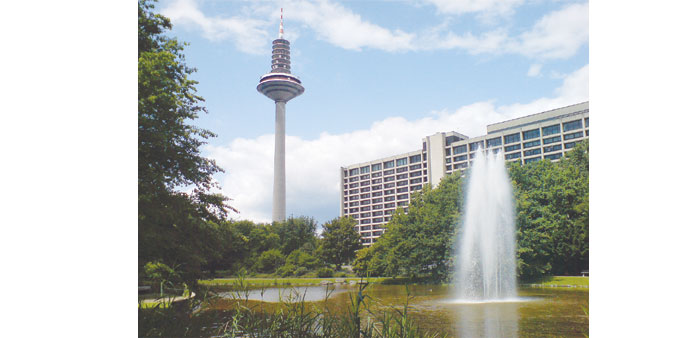A view of the Bundesbank headquarters in Frankfurt. The German economy probably stagnated in the second quarter in the face of political tensions abroad, the Bundesbank said yesterday.
Reuters/Berlin/Frankfurt
The German economy probably stagnated in the second quarter in the face of political tensions abroad, the Bundesbank said yesterday, but chances are its recovery will not be held up for long by conflicts on the rim of Europe.
Highlighting the underlying strength of Europe’s largest economy, the International Monetary Fund raised its forecasts for German growth, projecting an expansion of 1.9% this year — up from the 1.7% it had previously projected.
The Fund said Germany should give further impetus to its economy, as well as supporting the broader eurozone, by increasing public investment — something the healthy state of its finances gave it leeway to do.
The second quarter saw Europe’s economic locomotive lose traction. Construction activity in April and May was below that of the mild winter months, the Bundesbank said.
“Industry shifted down a gear. As well as calendar effects, increased geopolitical tensions likely played a role in this,” it said in its July monthly report.
“Considering that the services sector probably expanded further, seasonally and calendar-adjusted real gross domestic product could have kept the same level in the second quarter as the first quarter,” the German central bank added.
Eurozone policymakers are watching for any fallout from the Ukraine crisis and Israel’s ground offensive in Gaza, and any loss of momentum in the bloc’s biggest economy will be of concern.
But Germany’s economy is still poised to grow this year and beyond. The IMF expected 1.7% growth next year, compared with a previous forecast of 1.6%.
“We don’t view the German economy as stagnating,” said Sarah Hewin, head of research for Europe at Standard Chartered, pointing to calendar effects as well as outside factors. “We think that the second quarter numbers are more of a one-off.”
“But clearly, we have to keep an eye on what is happening to sentiment and how far geopolitical factors are causing weaker confidence,” she added.
Economists polled by Reuters earlier this month expected second-quarter growth of 0.2% in Germany, followed by 0.5% in each of the following five quarters.
Noting that France and Italy, the eurozone’s second and third largest economies respectively, were struggling, Hewin said she expected Germany to benefit from an upturn in activity in China as well as a solid labour market at home.
While applauding Germany for prudent economic policies and commitment to European integration, the IMF said the country could invest up to 0.5% of gross domestic product a year more over the next four years without violating fiscal rules.
“Most directors recommended that the authorities use available space to boost public investment in projects with true economic value, especially in transport infrastructure and education,” the Fund said in a statement.
Given that interest rates would likely stay low for a prolonged period, the Fund said Germany should be “vigilant to developments in the housing market and insurance sector”, adding it was reassured by plans to address issues in the latter.
Historically, domestic demand has not been Germany’s main economic engine but German consumers have propped up the economy recently as exports, its traditional backbone, have struggled.
Other recent data from Germany has been subdued, with exports, imports, industrial orders, output and retail sales all falling in May compared with a month earlier. Business sentiment has also taken a turn for the worse.
Last week, the ZEW think tank’s monthly survey showed German analyst and investor morale dropped in July to its lowest level since December 2012, suggesting the third quarter got off to a shaky start for Germany.
Like the Bundesbank, the ZEW also said geopolitical factors had weighed on German sentiment, pointing to political instability in the Middle East.
After its July policy meeting, the European Central Bank said geopolitical risks “may have the potential to affect economic conditions negatively” in the eurozone.
“I don’t expect any imminent further stimulus from the ECB just based on these increased geopolitical risks,” said ING economist Carsten Brzeski, pointing to risks to growth from the Ukraine crisis and conflict in Gaza and Iraq.
“If they get worse, I would rather expect co-ordinated action by major central banks - if things really escalate.”
The ECB cut rates to record lows last month as part of a package of measures to breathe life into a sluggish regional economy, where inflation is running far below target and there is a dearth of credit to smaller firms.

